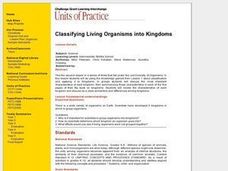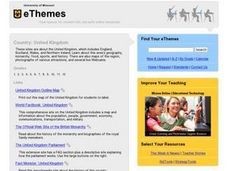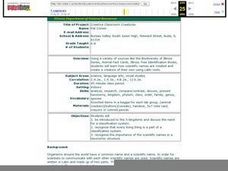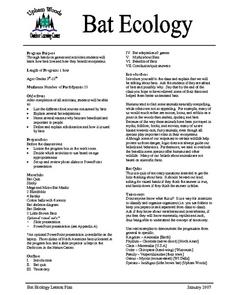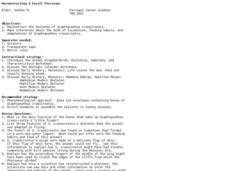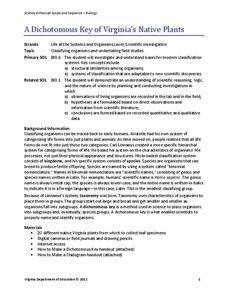Curated OER
Classifying Living Organisms into Kingdoms
Students create a flip book that describes the basic characteristics of the five main animal kingdoms. They research the animal kingdoms, include examples of organisms for each kingdom and illustrate the finished text.
Curated OER
Country: United Kingdom
Young scholars use the Internet to examine the food, sports and history of England, Scotland, Wales and Northern Ireland. They view photographs and maps.
Science 4 Inquiry
The Classification of Living Things
It's a classification sensation! Demystify why we classify using an inquiry activity that helps your class sort things out. Groups begin by classifying a variety of shoes before they research organisms and design their own dichotomous...
Curated OER
A Golden Age: Three West African Empires
Seventh graders research the kingdoms and rulers of Ghana, Mali and Songhay. In groups, they explore the trade routes and the spread of Islam. Using the internet, textbook and other sources, 7th graders collect information and write a...
Curated OER
Naming New Species
Young scholars explore science of taxonomy and the Five Kingdoms of life,
categorize organisms into Kingdoms, and create multi-media presentations illustrating knowledge of a Kingdom. They collect data and related pictures on the...
Curated OER
Discovering New Perspectives on Life
Students examine how the author's world view expanded by living in another culture. They discover the three lessons Storti learned as a Volunteer and find out how he learned them and reflect on the enduring understanding: "Living and...
Curated OER
Korean History Through Journaling
Students explore Korea and details about the Choson Kingdom. In this Korea instructional activity, students examine the geographical location of Korea. Students also take notes on a lecture about the Choson Kingdom and relations...
Curated OER
What's Integrity?
Young scholars explore both questions in relation to Steve Iams's writings about the subjects. They explain why self-discipline is central to the life of a Peace Corps Volunteer and define integrity and explain its application to their...
Curated OER
The Five Kingdoms
Fifth graders present research and information about the five kingdoms of living things using PowerPoint. They work in small groups in order to create a slideshow of 6 slides to present to the class. They give peer evaluations of the...
Curated OER
Creative Classroom Creatures
Students are introduced to the five kingdoms and discover why there is a need for a classification system. Using the internet, they examine how scientific names are created and practice putting animals into their correct classification....
Curated OER
Bat Ecology
Students, through hands on games and activities, discover how bats live and how bats benefit ecosystems. They play a game designed to show them how echolocation works and another to show how mother bats locate their young through their...
Curated OER
Biology Trivia Questions
Students answer 71 questions about a variety of topics in biology. In this biology trivia lesson plan, students use the internet to find the answer to questions about the systems of the body, their structures and functions, the different...
Curated OER
Reconstructing a Fossil Pterosaur
Students reconstruct the skeleton of the fossil Scaphognathus crassirostis. In this fossil lesson plan, students discuss the Kingdoms of life, geologic history and the history of the skeletons of species. Students are given 20 minutes to...
Curated OER
Where There's Smoke
Students view photographs to help them see how people live in rural Nepal. In groups, they imagine what it would be like to grow up in this type of community with little food and identify the problems associated with the Nepalise homes....
Curated OER
Serious Doodling
Students examine cartoons drawn by a volunteer serving in the country of Jordan. They draw a cartoon about a time felt different from others around them and share their cartoons with the class. The answer the questions: How can cartoons...
Curated OER
Microscope Investigation
Pupils explore physical science by participating in a science examination. In this microscope tutorial instructional activity, students read the book The Naked Eye and discuss the purpose for using a microscope in the field of science....
Cornell University
Classification
Explore the scientific method of classification. An interactive activity asks learners to create a classification system for a group of objects and develop a flow chart to communicate their systems. In addition, individuals use a...
Virginia Department of Education
A Dichotomous Key of Virginia’s Native Plants
Can your class correctly classify plant species? Individuals explore native plants of the local environment and correctly classify them into their respective categories. They investigate differences in the plants and discuss similarities...
Curated OER
Community & Architecture
Pupils investigate the Bamum people of Cameroon and the use of symbols in African societies. They read a handout, and design a palace using African symbols, presenting and describing their design to the class.
Curated OER
Where There's Smoke
Learners explore technology and how it can be used to bring about change in other cultures. In this investigative lesson plan students complete several activities using technology.
Curated OER
Listening Comprehension
In this listening comprehension worksheet, students listen to the teacher read the poem entitled, "Annabel." As the teacher is reading the poem, the students are called upon to answer the 41 comprehension questions included on the...
Curated OER
Land Plants and Algae
Students compare and contrast algae and land plants. In this plant lesson students discover what algae and land plants require for growth. The students discuss experimental design. The students experiment with different treatments of...
Curated OER
Creating a Classification System
Middle schoolers create classification system for Arctic-dwelling animals, the Arctic hare in particular.
Curated OER
Microorganism Multiplication
Sixth graders conduct experiments with yeast to study characteristics of microorganisms. They, working is small groups, change the variables in the experiments and note the results which they later discuss as a class.
